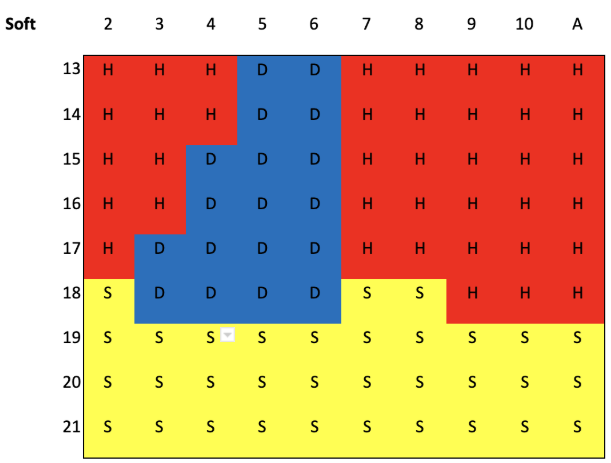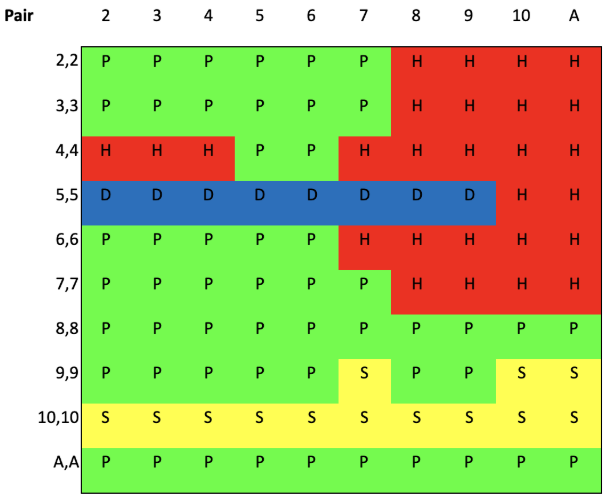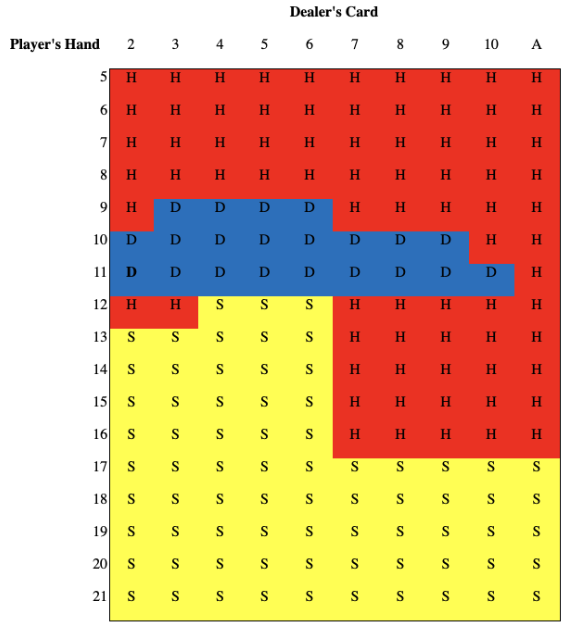Ten Basic Blackjack Strategies to Easily Follow
Because those charts have a lot of data and can be hard to follow, we’re giving you relevant, simple rules to stick to. These combine to offer the best blackjack strategy according to the math:
Always double down on 11 unless the dealer shows an Ace.
When the dealer’s upcard is 2-9, always double down on an initial score of ten.
When the dealer’s upcard is a 5 or 6, always double down on a soft 13-18.
Always split Aces and always split eights.
Never split a pair of fives or tens.
Never make the insurance bet
If the dealer has a 2 or 3 upcard, always hit on a hard 12.
If the dealer shows 9,10, or Ace, always hit A-7.
When you are dealt a pair of 2s or 3s, hit against a dealer’s 2 or 3.
Always stand with a pair of 9s when the dealer shows 7.
Maximizing Your Outcomes
A solid strategy is crucial for optimizing blackjack outcomes. This section covers essential aspects such as bankroll management, effective betting strategies, and leveraging promotions.
Bankroll management is fundamental in any gambling game, including blackjack. It involves setting a budget for your sessions and sticking to it. Properly managing your bankroll ensures you don't overspend and allows you to play for extended periods. Always bet within your means.
Effective betting strategies can also enhance your results. One popular approach is the Martingale system, where you double your bet after each loss and return to your original bet after a win. This strategy can help you recover losses and potentially gain a profit. However, no betting strategy guarantees success, so play responsibly.
Taking advantage of promotions can provide an edge at the blackjack tables. DraftKings offers various promotions and bonuses, such as deposit matches or free bet credits, which can give you additional funds to play with. Keep an eye out for these offers to boost your gameplay.
Remember, while a robust strategy can improve your chances, it's essential to approach the game responsibly. Set limits, play within your means, and prioritize enjoyment over outcomes. Good luck!
Different Variations of Blackjack
Blackjack comes in several variations, each with unique rules and strategies. Understanding these differences is crucial to developing an effective strategy. Here are key topics to consider:
4-Deck to 8-Deck Strategies: The number of decks used in a game can significantly impact your strategy. Generally, more decks increase the house's edge. Adjust your strategy accordingly, considering the increased likelihood of certain cards being dealt.
Understanding Rule Variations: Different online blackjack games may have varying rules for blackjack, affecting the game's overall odds and strategy. For example, some allow the dealer to hit on a soft 17, while others require the dealer to stand. Understanding these variations and how they impact your gameplay is essential.
Effect of Rule Variations on House Edge: Rule variations can directly affect the house edge. Rules that allow players to double down on any two cards or offer early surrender can decrease the house edge, improving your chances. Conversely, rules like the dealer hitting on a soft 17 or restrictions on doubling down can increase the house edge. Be aware of these variations and choose games with favorable rules to maximize your success.
Understanding different blackjack variations, including strategies for different deck sizes and rule effects on the house edge, allows for more informed gameplay decisions. Always practice responsible gambling and enjoy the excitement of blackjack at DraftKings.
Tips for a Successful Blackjack Session
Adopting a solid strategy can significantly enhance your blackjack session. Here are valuable tips for a successful experience:
Playing with confidence: Confidence is crucial in blackjack. Trust your abilities and the strategies you've learned. Make decisions confidently and avoid second-guessing yourself. Blackjack is a game of skill, and playing confidently can lead to better outcomes.
Avoid common mistakes: Be aware of common mistakes hindering your session. One standard error is failing to follow the basic strategy. Familiarize yourself with the basic blackjack strategy chart and adhere to it.
Keep bets consistent: The best betting strategy will almost always be to keep your bet value consistent. Don’t think you’re due for a win when you're having a bad run. Odds don’t care about your streak. It's the same with winning streaks. Just because you feel hot doesn’t change your odds for the next hand.
Progressive betting increases, where you double your bet each time you lose, can get expensive fast. The idea is one win will bring you back to even. However, you must be willing to lose a significant amount. if you hit a bad streak. Some people try progressive betting increases only after a win, so they’re only losing money they’ve won. This is a safer blackjack table strategy, but it can get expensive when splitting or doubting down.
Manage emotions at the table: Emotions can run high in blackjack, especially when money is involved. It's crucial to keep your emotions in check and avoid impulsive decisions. If you feel frustrated or angry, take a break and step away from the table. Remember, blackjack is a game of probabilities, and each hand is independent of the previous one. Stay calm and focused, and make rational decisions.
Minimize alcohol consumption: In-person or online, alcohol drops your inhibitions and increases the chance of risky play and betting. Blackjack is excellent because it involves strategy. So, increase your odds by avoiding alcohol. It may be easier playing online where you aren’t being offered drinks.
Don’t be pressured: Once your strategy is established, don’t let other players pressure you into making a choice. This sadly happens often. Ignore them and stick with your game. One of the perks of an online casino like DraftKings is you can avoid these interactions.
Set an amount and stick with it: Decide the amount you’re willing to lose in advance. No matter how your play progresses, stick with this amount. It’s easy to get swept up with emotions when you gamble, making you take chances at the moment. This is why it’s essential to determine your limit in advance and stick with it.
Following these blackjack tips can enhance your experience and improve your chances of success.
Stick to a Strategy & Play Smart
The strategy we’ve laid out will give you the best odds of winning. Basic strategy can seem complicated to memorize and overwhelming at first. Still, there’s good news—whether you’re playing blackjack at a regular casino or online at the DraftKings casino, you can have a strategy card printed out for reference.
With DraftKings, you can play blackjack whenever and wherever you like. You’ll find various themes, such as sports, retro, or your favorite holidays. Start as low as $1 per hand. Play variations with side bets if you want to take your blackjack further. “Four 20s blackjack” lets you play four hands and bet on twenties coming up on any of them. Practice responsible gambling and enjoy the thrill of the game responsibly.




